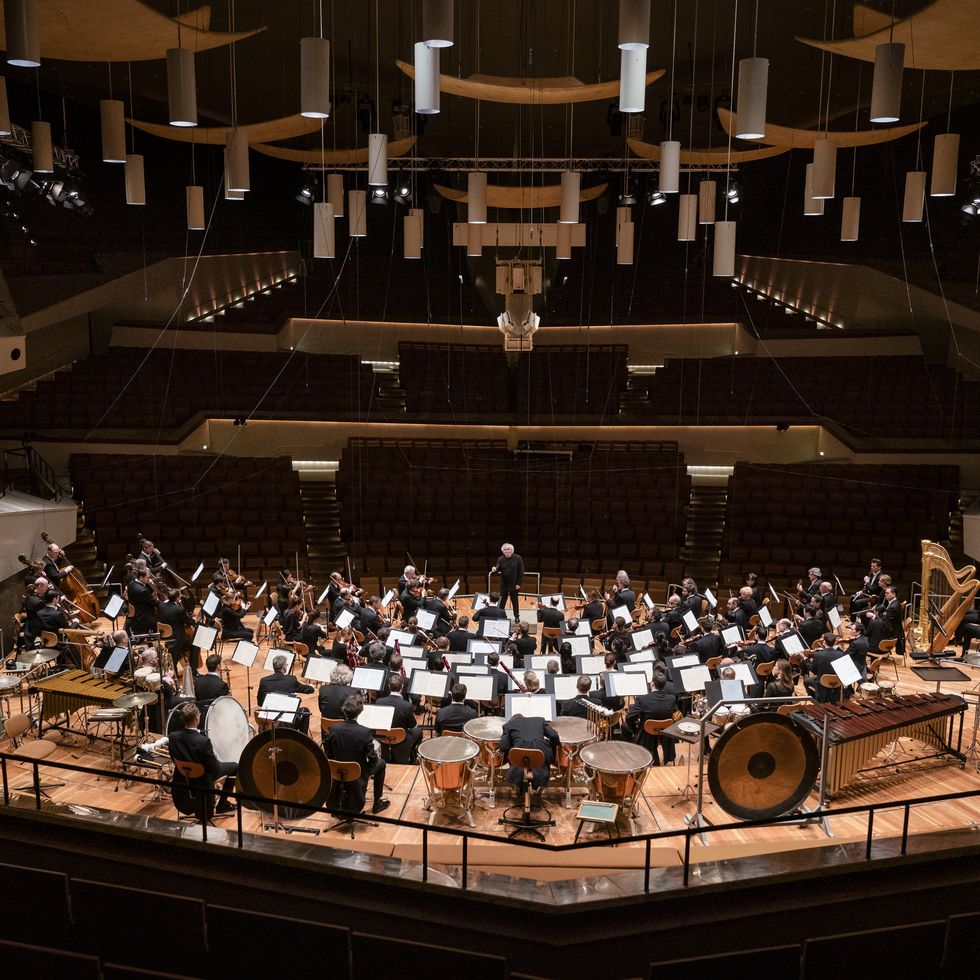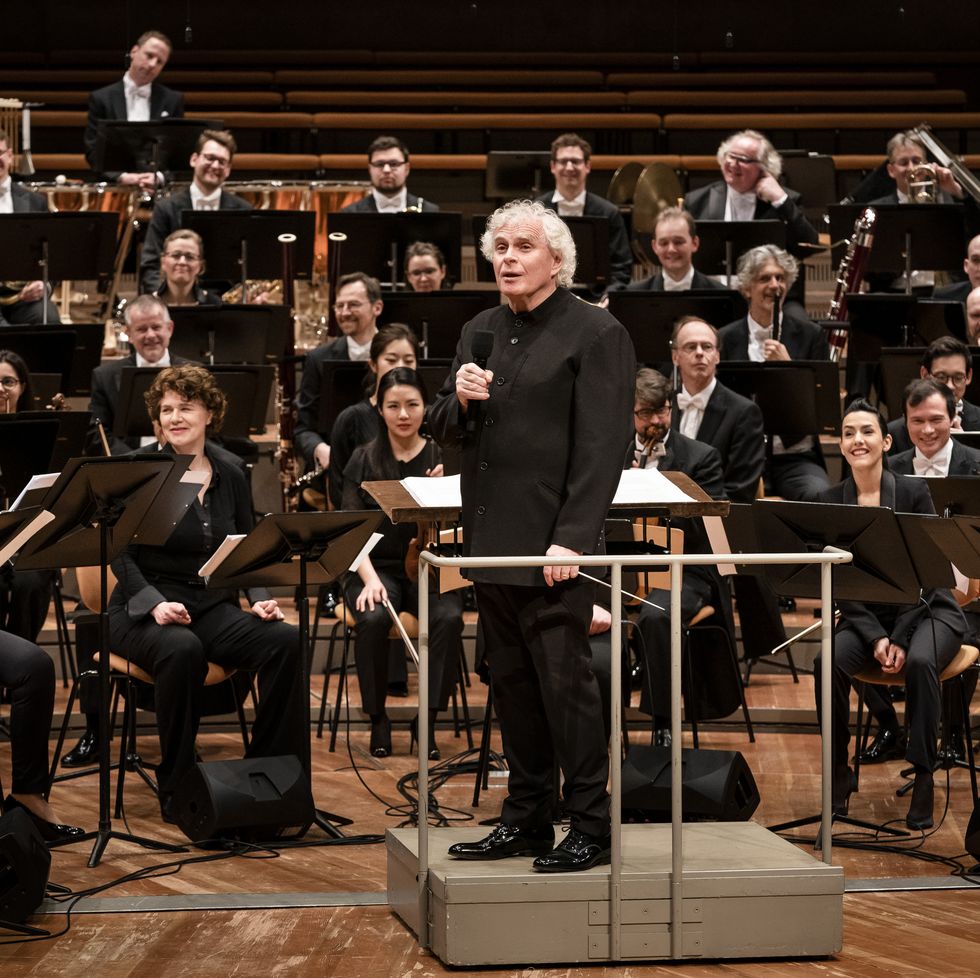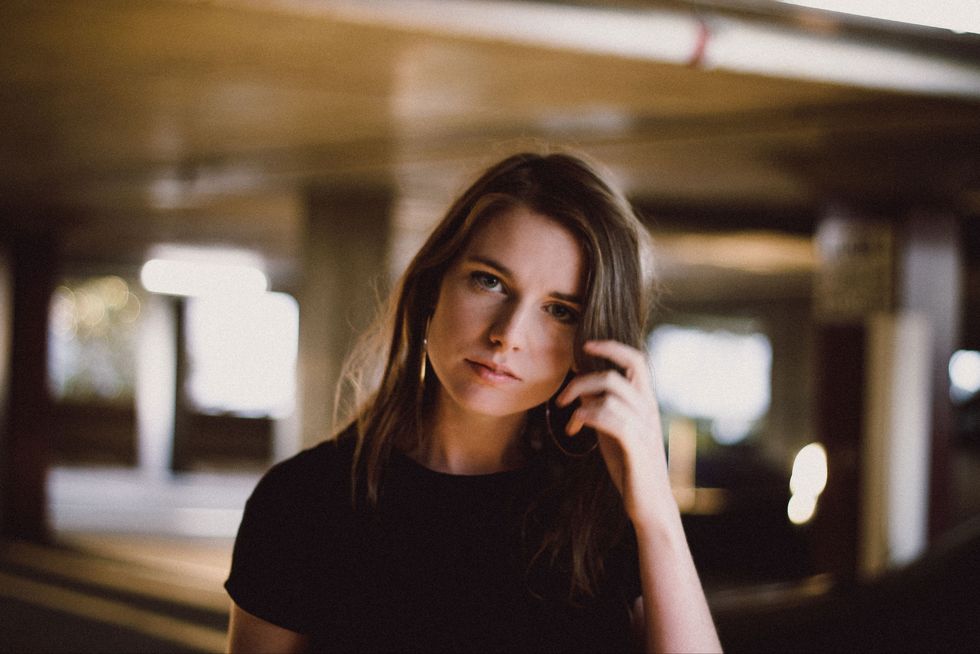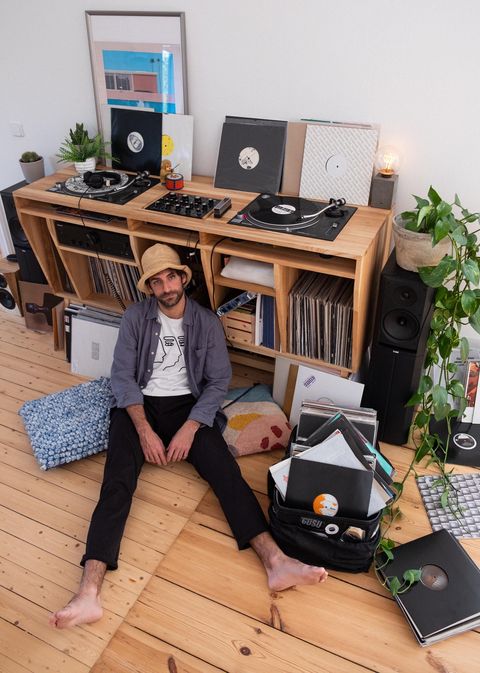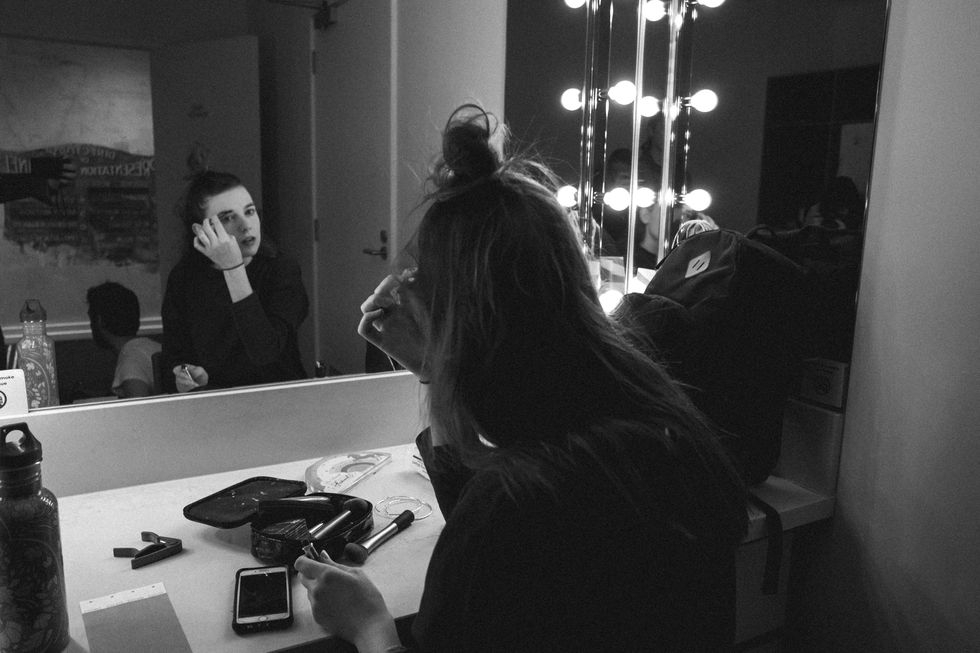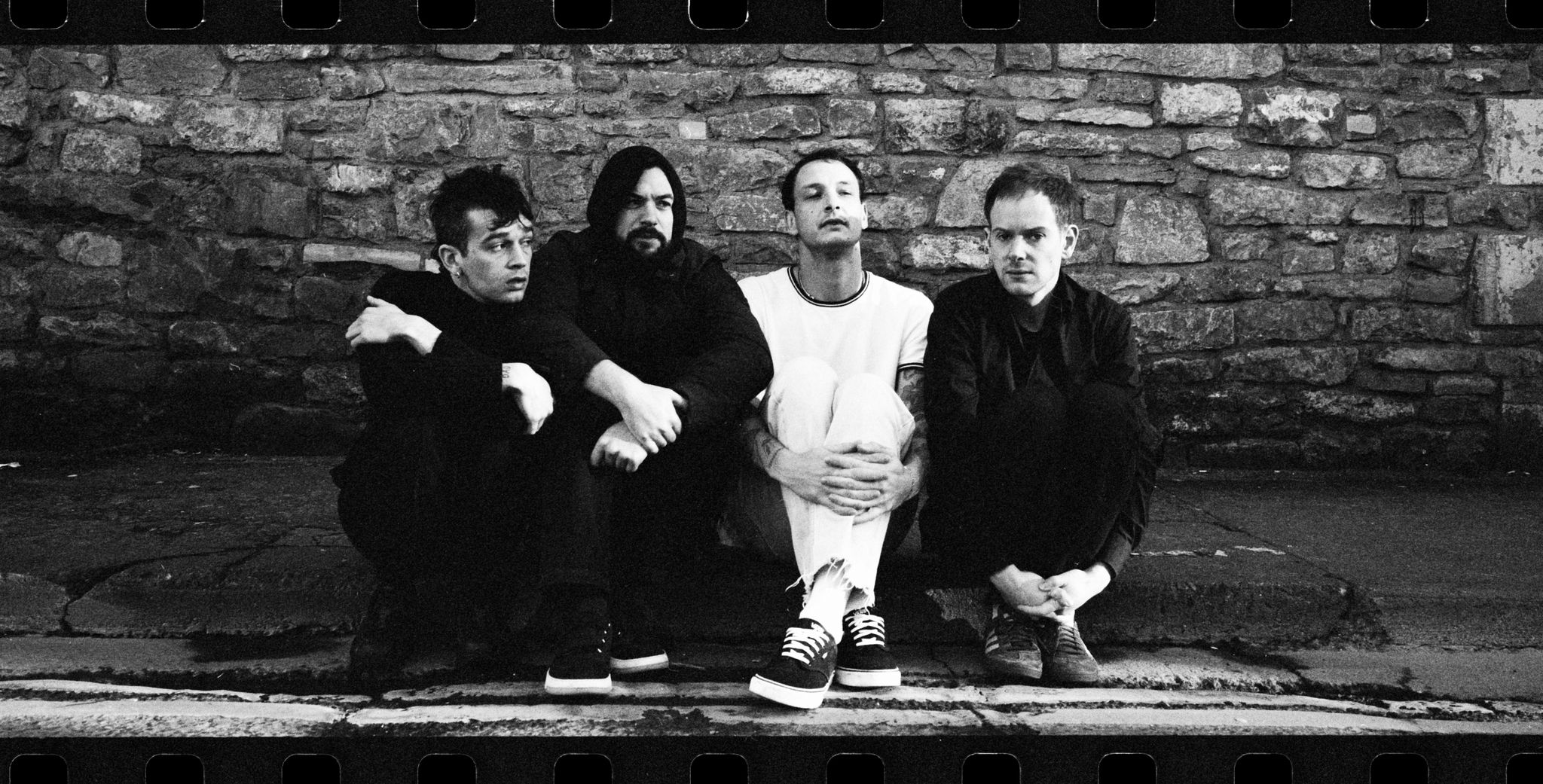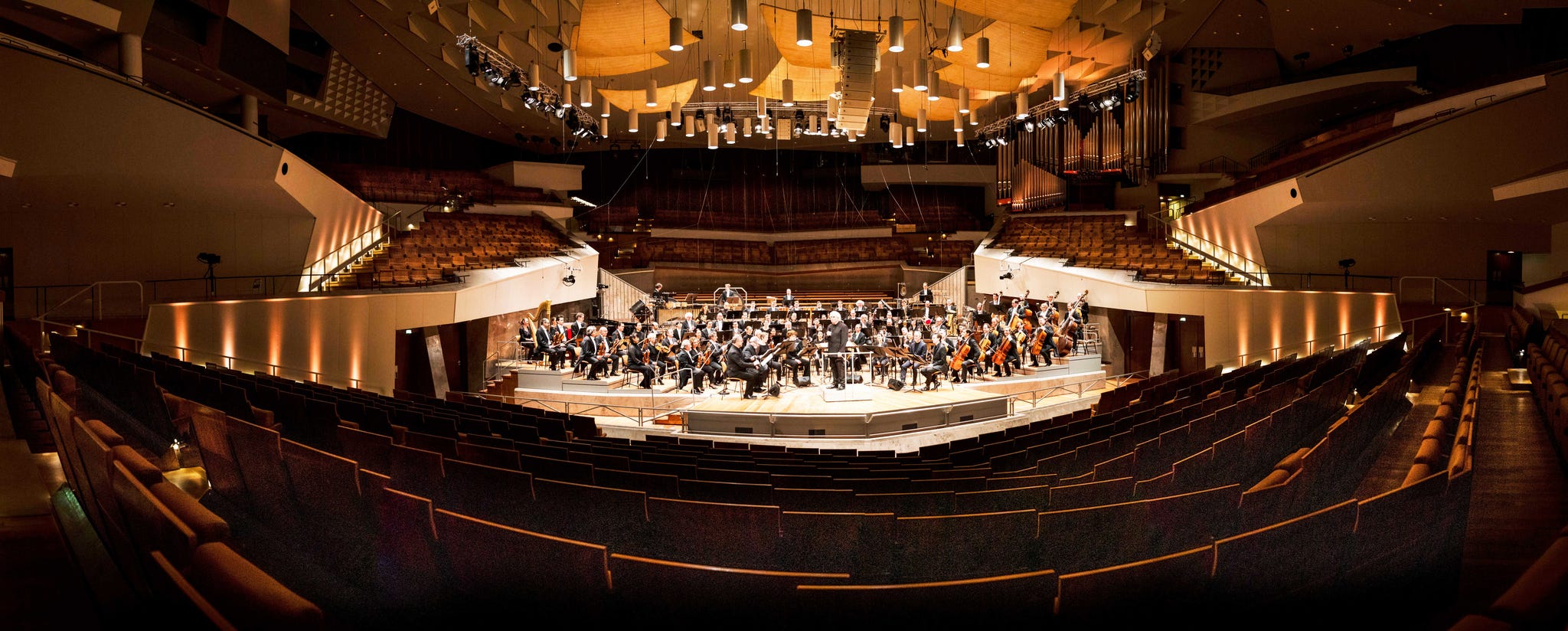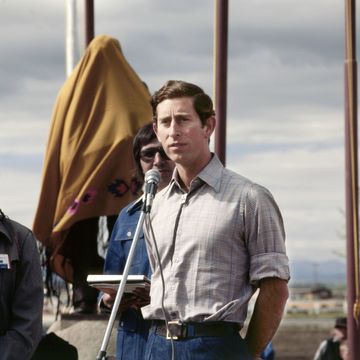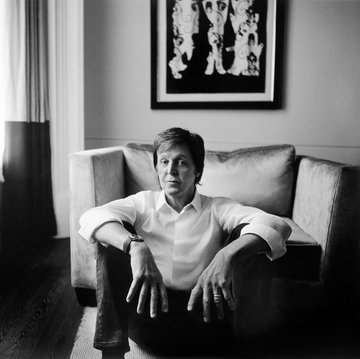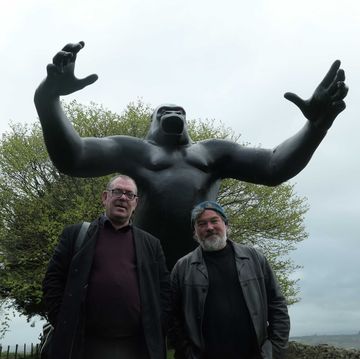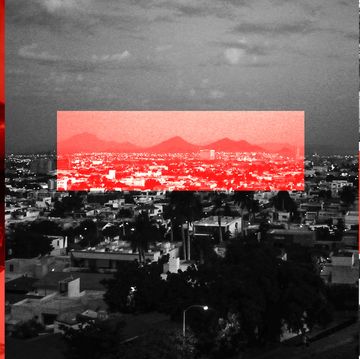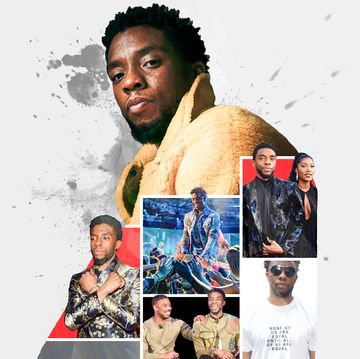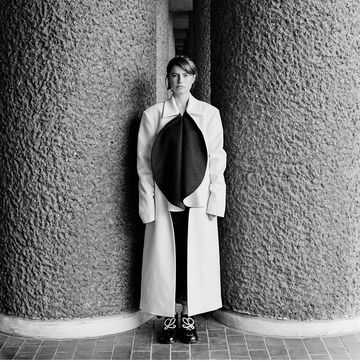At around eight o’clock on the evening of 12 March, Sir Simon Rattle stepped onstage at the Berliner Philharmoniker to an eery silence. It was his homecoming performance, with the orchestra that he’d led as chief conductor for 16 years, before his return to London in 2018. The musicians clapped him to the podium, but the seats surrounding them on all sides were empty.
Rattle turned, gazed down the lens of a camera, and addressed a global audience of thousands who were watching at home, in lockdown. “Ladies and gentlemen, good evening, wherever you are.” Beneath his unkempt silver hair he looked a little bemused. “Let’s just confirm that this is very strange. I think many of us on stage will have had experience playing contemporary music concerts to what we could kindly call small but select audiences, but at least there was always somebody there to look at.”
The musicians behind him giggled, a touch awkwardly. “But we just felt we must send a signal, or a reminder if you like, that even in times of crisis, the arts and music are desperately important, and if our audience can’t come to us then we must reach our audience in any way we can. And frankly, if we’re all going to get used to living more separately than we have for a while, then we’re going to need music more than ever.”
He turned, closed his eyes for a moment, then lifted his baton.
Remember gigs? Remember the unalloyed joy of standing shoulder-to-shoulder with screaming, sweating strangers? Or being doused in some liquid thrown from somewhere behind you, hoping it was beer? The terrible gigs where the band only played their new songs? The life-changing shows where they played the songs you love, and it felt like they were playing them for you? Do you remember the noise, the lights, and the ceremony of it all?
That’s all gone now, seemingly indefinitely. Covid-19 has killed what the anti-rave Criminal Justice and Public Order Act didn’t, what the elders in Footloose couldn’t. At the moment, the idea of breathing the same bodily fluid-filled air as hundreds of strangers is as appealing as licking a hospital doorknob. So, for now, we sit at home and listen to our favourite albums on Spotify, dig through old vinyl, tune in to streamed gigs and wonder whether a warm can of Carling might make it feel a little bit more like the real thing.
While we wait things out, the music is dying. And if we’re not careful, there may not be a live scene left when the pandemic is over. The music industry is used to headwinds, but the indiscriminate nature of Covid-19 switched the lights off overnight. No genre is safe, no ticket price or venue size protected from the fallout. “I like to plan for eventualities,” says Alex Hardee, a booking agent at global agency Paradigm, which numbers Ed Sheeran, My Chemical Romance and FKA Twigs among its hundreds of clients. “But there was no eventuality that I ever imagined in which every live show in the world would be taken out simultaneously.”
The global live music industry is worth some $30 billion every year. Or, rather, was. In a matter of weeks, Covid-19 shut down everything from pub gigs to festivals. And in doing so, it also made apparent the lopsided shape of the modern music industry, in which artists are paid to perform, but often barely anything for the music they record. One of the truisms of the streaming era has been that while Spotify might have gutted the income you make from records, it makes it easier for people to find your music. That grows your live audiences, which is where you make your money. Now, with live audiences at zero, that deal is looking increasingly unworkable.
What’s left is an ocean of musicians wanting but unable to work, and a surrounding infrastructure of labels, distributors, record shops, session players, music venues and tour managers grappling with a precarious situation that nothing could have prepared them for. The only thing that does seem clear is that whatever version of the music industry emerges, bloodied, from this pandemic, it will bear little resemblance to the one that came before.
Back in late February, Australian singer-songwriter Angie McMahon was preparing for a season of European summer shows. She had released her debut album, Salt, in July and was excited to perform it for her fans. It was set to be a landmark period in her young career, headlining across the UK for the first time, and the culmination of many years’ hard graft that had taken her from writing her first songs as an adolescent in her Melbourne bedroom to supporting Bon Jovi’s stadium tour as an 18-year-old. More recently, she’d opened for the likes of the Pixies and Mumford & Sons on the road. She’d earned her time at the top of the bill.
Then the coronavirus began its spread and countries shut their borders. McMahon’s manager, Charlotte Abroms, realised the European summer season was in jeopardy. Even as she confirmed a booking at Latitude Festival in Suffolk, in late July, she wasn’t confident that the virus would pass quickly enough for it to happen. Soon after, promoters cancelled all dates across Australia and it was expected that Europe would follow. On 13 March, recognising the health risks and the financial implications of cancelling after booking flights, Abroms pulled all dates through June and emailed McMahon’s band with the disappointing news. Three dates, including Latitude, remain, but Abroms isn’t packing her suitcase anytime soon.
In the last two decades, touring has supplanted record sales as the way artists make a living. Streaming has upended the economics of an industry that was built on selling records and, 14 years after Spotify was founded, the numbers still don’t really add up. Streaming companies pay only a fraction of a penny per play and, depending on the specifics of the deal signed, most of that money – sometimes as much as 80 per cent – flows directly to the record labels, leaving artists with a slim slice of a modest pie. Physical sales, meanwhile, are in decline, and other means of income, like merchandise sales, are undependable. It’s a volume game and only the top artists generate enough streams to support themselves.
For an artist, money comes in cycles. When they're writing and recording an album, their label advances them funds. When it's released, there's a spike in proceeds, much of which flows back to the label to pay back the advance. They go on tour and play festivals, which bring in more money, as well as sell a load of merch. Then the spotlight starts to fade and it's back to the studio, with another advance, to start the process again.
At the time of writing, with a still-new-enough record, McMahon is averaging more than a million streams per month. Going by the publicly available numbers on its payment model, that would, if we assume the most generous figures, equate to thousands of pounds every month. Her label takes a chunk of this (her deal is much more generous than most) but, for now, McMahon sees nothing, because she’s still recouping her advance. In more normal times, live shows would be the only way for her to earn enough to eat.
Especially for mid-tier artists like McMahon, summer is when you make the bulk of your income. Warm weather means festivals, which can pay well and mean an artist can squeeze multiple gigs into a few days. They’re also vital for finding new fans, who might stumble across an act they’d otherwise never have heard, fall in love, then go buy a t-shirt and tickets to a tour. With all those shows gone, hundreds of thousands of artists are now wondering how they'll pay their bills for the rest of the year.
The more niche the artist, the sharper the problem. For many DJs, for whom ‘touring’ is as simple as jumping on a plane with a bag of records, streaming or physical sales are so hard to make money off that recorded music is only really a marketing tool – make a hit and you get more bookings. Artists like Thibaut Machet, a French DJ based in Berlin, spend their lives flying from nightclub to nightclub, playing two or three shows across a weekend. Fees range from €500 to €1,500 (£430 to £1300) per performance, minus flights and booking fees, but with clubs around the world shuttered, that number has dropped to zero overnight. Machet has been forced to seek assistance from the German government. A grant covered a few months’ rent, but he doesn’t know when he’ll be earning again. “You have to put money to one side but it’s hard to save nowadays,” he says. “People think that we earn so much, but the reality isn't like that for many DJs in my range.”
Much-loved UK DJ and writer Bill Brewster has turned to streaming in an attempt to fill the gap, seeking donations for sets played from his house. “It’s not until something like this happens that you realise how precarious your living is,” he says. Not being a soothsayer, last year he spent his savings on house renovations. With nothing in the bank, he’s fallen back on a £500 cheque from his mother.
As entertaining as it is to groove along to Brewster’s slick disco and house selections from the comfort of your own home, and smile as Mable, his beloved cockapoo, shuffles besides him, the experience can’t match seeing him – or anyone – play in-person. Live music just isn’t the same without sticky air, overpriced lager, and a sound system that rattles your insides.
Donations have provided a little welcome relief for Brewster, enough to cover weekly food expenses, but for bigger artists, the livestream has become an opportunity to connect with fans more intimately than they can from a stage in a stadium. John Legend’s dulcet tones are even more striking when up close, as are those of Chris Martin and James Bay. They’re also a means of reaching those normally locked out of traditional venues, whether that’s because of disability, location or financial limitations, which will open up new markets in the future. “The toughest thing for an artist is creating a new fan,” says Cory Riskin, global music agent at APA. “Traditionally we do it by playing festivals but we’ve seen that these virtual festivals are the best way of getting new fans quickly.”
Though there’s clearly never a good time for a global pandemic, coronavirus has arrived just as the music industry looked like it was finally adapting to the streaming era: 2019 was the fifth straight year of growth, and the three major labels alone – Universal, Sony and Warner – now generate nearly $800,000 per hour from music streaming services alone. But while the rich get richer, the independents suffer.
“We have an issue with so much music and art being essentially free and artists receiving a very small amount of money for work that they put all of their energy and ideas into,” says McMahon. “It feels like the value of the art has been disrespected by the companies who can make plenty of money and distribute a very small amount to the art creators. With the current lockdowns, it highlights the capitalist structures that we operate under and how artists, along with many other contributors to society, are taken advantage of.”
Niko Seizov, an artist manager working in electronic music, believes a thinning of the herd is inevitable. “As their income disappears, a lot of the smaller artists will have to start looking for day jobs, which will stop them from putting enough time into creative pursuits,” he says. “This will harm the music industry because creative progress and revolution always starts from the bottom.”
Stanley Dodds, a violinist who joined Rattle on stage in March, supplements a basic salary from the Berliner Philharmoniker by working as a freelance conductor. He has seen his income fall “immediately and brutally.” He’s fortunate that the orchestra continues to pay him as the crisis unfolds, but most of his peers are freelancers with no safety net.
Covid-19 might catalyse reform for the benefit of those who do stick it out. Musicians have asked Spotify to triple payments to cover lost concert revenue, which would enlarge the pie, although it’s unlikely that any streaming platform will offer up significantly more on a long-term basis – Spotify was still barely profitable at the start of year, and rivals like Apple Music are basically loss-leaders, designed to get more users into their ecosystem (as Tim Cook put it in 2018, “we’re not [doing it] for the money.”)
It’s more feasible that the pandemic ignites a discussion about recording contracts. Though streaming services have reshaped the link between retailer and record label, the label-artist relationship has barely changed since the Seventies. Traditional recording deals pay artists on a royalty basis, around 15-20 per cent, with the rest kept to cover things like marketing, production costs and the label’s own profit needs. But as one executive puts it, in an era when the revenue from record royalties have collapsed, these are “antiquated,” and preclude many artists from generating real money from their recordings. Independent labels have been moving towards more transparent, bespoke artists deals for some time, and Covid-19 will “shake everyone up and show that we all need to look at them.”
Even if artists do end up with more money from the music they make, in the short-term at least, little of it will flow to the industry that relies on their work. Jono Steer, a live sound engineer, was supposed to be joining McMahon on her tour. The Melbourne native has been in the music industry for 20 years and began working with McMahon on her first national tour in 2018. He's since become a staple in her team, working 200 shows. Besides his role as McMahon’s front-of-house sound engineer, Steer is also her driver and tour manager.
The cancellations have hit Steer hard; 60 per cent of his income comes from live events. Bigger bands can afford to put their touring crew on salaries, with contracts that protect them from cancellations, but artists at the beginning of their careers tend to pay their crew by the show day, travel day, and per diem. Even a small tour requires everything from roadies to lighting engineers and sound techs, but few have enforceable contracts in place. When shows don’t happen, they don’t get paid.
“Every single colleague of mine has been affected,” says Steer, “and some have no prospect of any further work for the entire year.” This shadow industry is invisible to most music fans, but without them, shows don’t happen. There’s a real concern that many will have to leave the industry if the shutdown lasts months. When we can eventually get back into clubs and concert halls, there might be no one left to set up the sound, run the lights or even man the doors.
Steer can fall back on producing bands from his home studio, but lockdown means few can get there in the first place. Many artists also fund their studio work with touring – without touring, they cannot afford the studio. “There's just much less money in the whole industry at the moment,” Steer says. His total income will decrease by around 70 per cent, turning him to state benefits.
McMahon has offered to pay her team an upfront fee of 50 per cent for shows that were cancelled within two weeks, and industry giants are offering assistance, too; Live Nation Entertainment has launched an initial $5m fund designed to help touring and venue crews. While it does little to protect independent contractors like Steer in the future, it might at least pay the rent right now. It could also lay the groundwork for new arrangements in the future. One booking agency representative explains that like session musicians, who are often placed on a retainer to ensure they don't join other tours, crew members could also be placed on contract with a basic and steady wage.
Steer, meanwhile, hopes that Covid-19 will trigger a wider structure to protect independent contractors, like himself. “Whether that's unionisation, changes in government legislation, or just more accessible funding across the board through grants and subsidies, we should learn from this experience and put things in place that make us less vulnerable in the future.”
No one knows when that future will be, but like sport, live music is likely to be one of the last things to be permitted when lockdown does eventually lift. When it does, the landscape will be outlandish and lean. In the first few months, expect an explosion of new releases, either those delayed by the virus or those made while artists were locked away in their homes. “I’m seeing creative energy in our industry that far surpasses anything before, not just on an idea level but at execution,” says music publicist Neil Bainbridge.
At first, artists will block-book venues that survived the shutdown, but there might not be many left. The UK’s clubs and gig venues have been shutting at a horrifying rate since the Great Recession and Covid-19 could kill off many of those that have survived. Reports suggest that only 17 per cent of grassroots UK venues are financially secure for the next two months, meaning that more than 500 concert spaces might have shut their doors for good at the start of lockdown.
Promoters are also facing significant losses. Typically, insurance would cover them, but policies almost universally exclude communicable diseases unless purchased specifically, which is “extremely rare,” according to one broker. At the beginning of the year, some insurers even explicitly removed coronavirus from their coverage. In March, Austin’s South by Southwest announced that it is responsible for all costs because ‘disease outbreak’ was excluded from its insurance cover. London house and techno festival Re-Textured was similarly unfortunate. Neither might return in 2021.
The effect on the festival season has been catastrophic. In mid-March, Glastonbury announced the headliners for its 50 anniversary edition. The move seemed, at best, optimistic. Days later, Emily Eavis tweeted that the 2020 festival would be cancelled, joining the likes of Burning Man and Download. Others, like Coachella, have delayed until the end of summer, hopeful that, come September, things will look rosier. Ibiza’s clubs are attempting to shift the entire season back to the autumn, when they hope “to celebrate the end of this bad dream”.
Promoters at every point on the spectrum will suffer. Some punters will be itching to get back into the mosh pit; others will remain wary of sharing air with strangers. The recovery is likely to be sluggish. The smaller, boutique events will die off first, taking with them the scene’s diversity and texture. The platform they provide for young and experimental talent will disappear. Those that remain, as they seek to claw back losses, will prioritise low-risk events with high margins, which means we’ll see the same line-ups appearing on posters across the UK.
Seizov, who works with an improvised electronic music project called Circle of Live, expects difficulties in rescheduling their cancelled shows. “Every promoter is looking for the sure-fire ticket sellers that can deliver a performance at minimal cost,” he says, “and we’re just too high-risk because of our production demands.” With profit as the priority, artists and promoters will save where they can. “You’ll see fewer production-based shows,” says Hardee. “You’ll see artists going back to the basics, so the LED light screens and confetti will go, because people will need to make money again.” Event insurance premiums are likely to shoot up, as will ticket prices.
Artists who’ve cancelled or rescheduled tours will also be trying to save money. When a band books a run of dates, they commit to their production costs up-front. If it doesn’t go ahead, they’re still liable. The 1975, who were due to hit the road in the US this spring, sidestepped a multi million-pound bill for their North America tour by cancelling before they had booked transport and backline support. “If we were to cancel the tour on, say, the third date, those costs would have remained even though the income had disappeared,” says manager Jamie Oborne. “It would have bankrupted the band.”
The final piece of the puzzle is the relationship between artists and fans. Blame Spotify and a blinkered, cannibalistic record industry all you want, but we’re the ones who Limewired artists into the ground; who came to see music as something that should be free or close to it, rather than as art that deserves to be paid for. But by exposing systematic flaws and highlighting alternative means of artist-audience interaction, could Covid-19 change that? Struggling artists have started putting out exclusive songs or performances available for a fee, and others have set up online production workshops. These are temporary fixes, but they close the loop between creativity and reward.
While live concerts, like Berliner Philharmoniker’s, have proliferated, most of them have been charitable or free to attend. At some point, though, digital tickets prices seem inevitable. Perhaps ahead of the curve, Erykah Badu charged a couple of dollars to enter her Quarantine Concert series. “There’s always been a market for it and in this lockdown, people have realised that it’s cool,” says Marc Geylman, founder of Cardinal Artists. “Eventually I think it will turn into a business.”
The Berlin Philharmoniker took a stride in this direction more than a decade ago. In 2009, realising that income from their recordings was plummeting, they sought a new means to disseminate and monetise their existing work. The answer: Digital Concert Hall, a platform, accessed through a paid subscription, that allows fans to stream their live concerts and revisit hundreds of recordings, as well as watching documentaries and bonus films. For now, they’re offering free access, so fans can enjoy the recordings while the actual concert hall is closed.
Granted, this works better when you’re attempting to capture the refined air of a concert hall – no stream can get close to the sweaty energy of a rave. But it is a step in a new direction, and you only have to look at gaming, where audiences support gamers with subscriptions and sponsorship through platforms Twitch and Patreon, to see how anachronistic the music model is. "If you were to rebuild the music industry from scratch, you wouldn’t monetise it the way it is currently,” says George Connolly, an artist manager at Young Turks.
Beyond this, Covid-19 might also recalibrate our perception of an album’s worth. Never before has the fragility of music been clearer, and this might encourage us to support artists by buying, rather than streaming, our music through transparent, artist-friendly platforms. "In terms of money in an artist’s pocket, purchasing a single album or LP is worth thousands of streams," says Josh Kim, COO at Bandcamp, a platform where independent artists and labels can sell direct to their fans.
The site normally takes a 15 per cent cut from each sale (that’s significantly more generous than the industry standard: for comparison, Apple takes 30 per cent for sales through iTunes), but on 20 March, to support its community of musicians, artists and creators, Bandcamp waived its commission entirely. In 24 hours, fans bought $4.3m of music and merchandise – 15 times an ordinary Friday – with every cent flowing directly to artists. The fundraiser was so successful that Bandcamp is repeating it on the first Friday of every month for the foreseeable. For the 1 May edition, more than 150 labels and producers, from Jack White's Third Man records to legendary techno label R&S, either produced exclusive releases, donated a portion of their proceeds to charity or funnelled all revenue directly to their artists.
Sir Simon Rattle wrapped up his concert at 10pm. There were no queues for the doors, no rush for the bathrooms. There were no ticket-holders or bartenders buzzing around, only a small camera crew positioned front and centre, capturing Rattle’s every move – from the last dazzling wave of his baton to his customary bow at the end. It made for a pleasant viewing, peculiar but thrilling, and within it lies inherent value on both sides of the lens.
Reflecting on the global lockdown, one Twitter user described the Covid-19 as a “truth machine,” in that it is “brutally exposing” the shortcomings in how music is structured. One day, we’ll move Covid-19 from our present to our pasts, and the cogs of this billion-pound global machine will be in motion once again. Venues will open their doors, artists will dust off their passports, and we’ll once again have live music, and with it a novel appreciation for standing among a room of hysterical strangers to experience it. When that day does eventually come, it’ll be all the sweeter – but in this transition, we must build upon what we’ve learned from this pause. If we’re smart, from the ashes will emerge an industry that works for everyone. Because god knows we’re all going to need to dance again.
Like this article? Sign up to our newsletter to get more delivered straight to your inbox.
SIGN UP
Need some positivity right now? Subscribe to Esquire now for a hit of style, fitness, culture and advice from the experts
SUBSCRIBE

